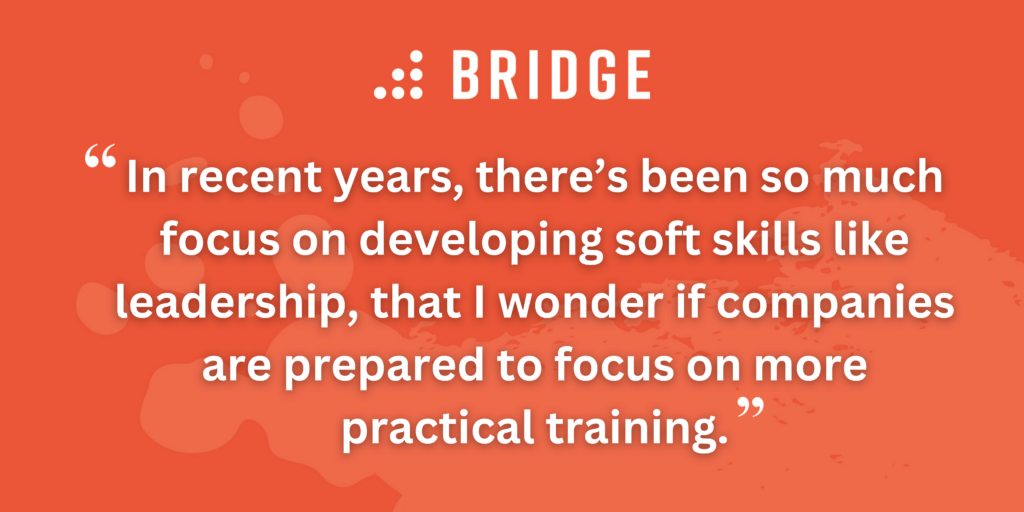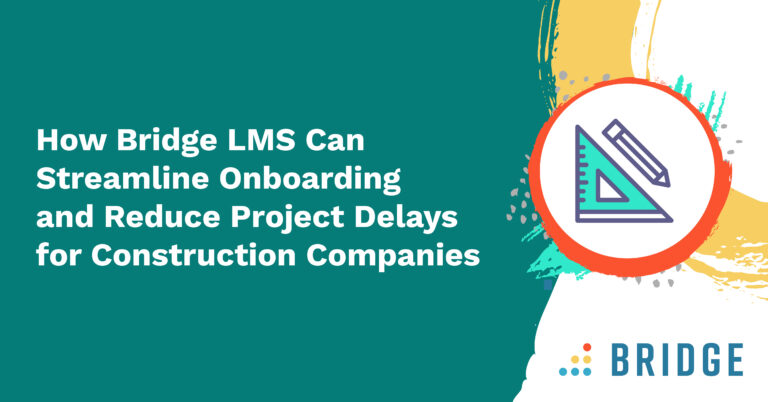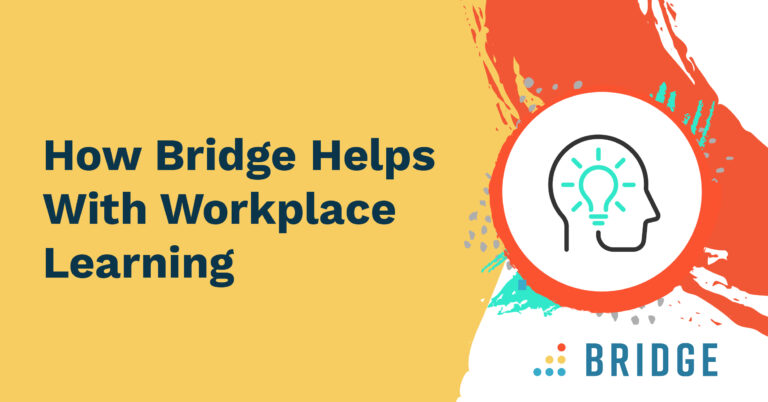With 2025 now upon us, Akash Savdharia, Vice President of Talent Products & Solutions at Bridge, reflects on the trends that have shaped the L&D industry and learning management systems in recent years. In this article, Akash engages in a discussion with Karie Willyerd, Chief Customer Strategy Officer of GP Strategies, and muses on what we can expect going forward.

From ultra-personalized learning to an increased focus on AI, the training landscape is rapidly changing. The more we know in L&D, the better we can prepare to deliver effective training that our organizations value.
I sat down with Karie Willyerd, Chief Customer Strategy Officer at our sister company, GP Strategies, to discuss what’s on the horizon. With over 20 years of experience in L&D—including roles as a CLO, Harvard fellow, and workplace futurist—Karie is perfectly placed to share insights on the factors that might influence you in 2025 and beyond. Read on to see what we think the world of L&D will look like going forward, so you can plan for a great year of learning in 2025.

MORE FROM THE BRIDGE BLOG | ‘5 Ways to Get Your Training Program Ready for 2025’
1) Changing Job Markets Could Lead to Roomier L&D Budgets
Akash: First, let’s chat about ROI. A big trend I saw in 2024 was a focus on value. Companies want a clear link between their LMS and its ROI. Leaders need to know that upskilling or reskilling programs will drive value. CLOs are being asked, ‘We spend a lot on corporate training, so how do we show more ROI from these programs?’
Karie: I agree with you that CLOs were under tremendous pressure to prove the ROI for any investment in 2024. I wonder if that might be turning around in 2025, and whether we can expect people to receive larger budgets. There are certainly early signs of the growing awareness that L&D will need to play a big role in the changing job market.
Akash: Let’s dive deeper into that. How do you think the job market will change?
Karie: I think we can expect to see skills shortages become more of a pressing challenge across various industries. In the manufacturing sector, for instance, more than 65% of employers say the inability to attract and retain employees is their biggest challenge. Deloitte’s analysis of Bureau of Labor statistics also recently found that 1.9 million manufacturing jobs could be unfilled by 2033 if employers can’t address these skills- and applicant gaps.
The healthcare sector is facing a similar challenge. The AAMC (Association of American Medical Colleges), predicts that the U.S. will face a physician shortage of up to 86,000 physicians by 2036.
Even the green energy sector is dealing with this issue. LinkedIn’s Global Green Skills Report shows that only one in eight workers have green energy skills. To close these kinds of skills gaps, businesses will have to think about educating talent in new and creative ways.
In recent years, there’s been so much focus on developing soft skills like leadership, that I wonder if companies are prepared to focus on more practical training.

2) An Increased Need for the Right Learning Technology
Akash: In this changing skills landscape, the question is: ‘How can we make sure people are skilled, or reskilled and retrained where necessary so that they can contribute to a productive workforce?’
Karie: I’ll say that the world of skills is so complex that you can't do it without the assistance of software. And that software capability has to help leaders understand the skills workers need, while providing the corollary learning content to get them where they need to be.
Akash: Right. And there are some interesting things on the horizon for learning technology, particularly related to AI and personalization.
In recent years, many companies have acquired rich content libraries, but utilization of that content has been very poor. Leaders are increasingly talking about how they can get more from learning content with personalization.
This is where we can expect AI to increasingly come into play. When I listen to other L&D leaders, I can imagine a near future where AI helps facilitate adaptive learning to fine-tune content specifically for each individual learner. Such ‘turbocharged AI-powered personalization’ will take learning to the next level.
Karie: I’d agree that there's an amazing AI revolution underway. We may not know what the results of all this change will be, but it bears repeating that AI is not going to replace humans, so much as humans with AI skills are going to replace humans who don't have AI skills.

READ MORE | ‘How to Use AI With Your Learning Management System’
3) Disruption to the Entry-Level Skills of Yesteryear
Karie: Apart from AI’s impact on learning technologies, we should also consider how AI will impact the job market itself. I think there's going to be a shift in the skills enterprises require, partly because AI might replace some entry-level jobs.
How do we get people ready to take up roles as soon as they graduate from college? Many organizations have been using the apprenticeship model to get employees where they need to be. But if AI can now perform the kinds of entry-level tasks currently done by apprentices, we’d want to help people reach a higher level of competency faster and in different ways than we have in the past.
L&D professionals might consider having a junior employee join a team as an understudy, or let them take on some of the smaller projects and work their way up by osmosis.
Akash: Learning technology can really help organizations with speed and scale when it comes to this kind of training. It can look at an industry and the roles required and very quickly break that down into the critical skills the organization urgently needs. The right software can also use that data to develop the type of learning content and training that helps the business be competitive.
Karie: Yes, it’s hugely helpful. L&D professionals, even at the CLO level, can struggle to understand what employees need. They may know the skills required for 30 different new job titles coming into the business, for example. But what about each of those people's aspirations and dreams? Or if they want to move up? There's no way you can help them reach their goals without software.
4) Attrition That Can Only Be Counteracted By Championing Talent Mobility
Akash: Speaking of moving up, do you think talent mobility is going to become even more important?
Karie: Yes, I do! Many Baby Boomers will be moving out of the job market soon and so we've got to backfill those roles in the next couple of years.
A complicating factor is that we’ve been seeing a reduction in college graduates. Colleges talk about the ‘education cliff’—the dropoff some countries are seeing in young people enrolled to earn degrees. Fewer young people now try to earn college degrees in the United States. This can have a knock-on effect when it comes to having the right talent to move up into roles.
Akash: What can organizations do to prepare for this?
Karie: I’d say it's always easier to hold on to good people than it is to try to find new talent. I think it’s good for a business to be a place where people feel like they can stay long-term and where they can grow without feeling stuck.
Encourage talent mobility and you allow your people to really flourish in their career. This will become crucially important as I think we can expect to see a real war for talent coming up.
Akash: Yes, that's true. The possibility of a 'Great Resignation 2.0' has been looming for the last couple of years. Potentially, this war for talent will start heating up in the next year. Combine this with the growing skills gap, and organizations that don't embrace career- or talent mobility will really fall behind.
Twenty to thirty years ago, someone might get a degree in finance, enter an organization as a financial analyst and their career aspiration would be to become CFO—there’s a clear throughline.
But those days are gone. Careers aren't linear anymore. Employees are moving between departments more and more. And skills training will need to adapt. To our point earlier, the right type of software is crucial for providing greater transparency to businesses and learners so they can see what training and development is needed.
Karie: Right, and it helps with speed and flexibility too—which is crucial because skills are changing quickly. The right content has to be accessible through an LMS.
At the very least, an LMS has to be able to identify what the necessary skills are in a business. But I think we're not very far at all from interacting with intelligent software that will help us become more intelligent as well.
It's not your daddy's LMS anymore! I think we can look forward to an intelligent LMS that keeps on growing and becoming smarter in terms of interacting with and supporting humans.
Akash: Agreed! And to that I’d add, as a final thought, that supporting each individual learner to meet their specific outcomes is going to be hugely important.
At Bridge, our philosophy is it shouldn't be easier for your employees to quit and find a new job somewhere else than it is to stay with you. They should have all of the necessary tools to fully understand what their company needs from them and to develop their skills.
Bridge Can Help You Stay Ahead of the Curve
We hope you found this conversation between Akash and Karie useful as you prepare for another year of innovative work in L&D. We’d love to know what you think as well. Get in touch with us on LinkedIn to keep the conversation going. Or book a demo below if you’d like to see how Bridge can help you navigate eLearning in a changing world.




